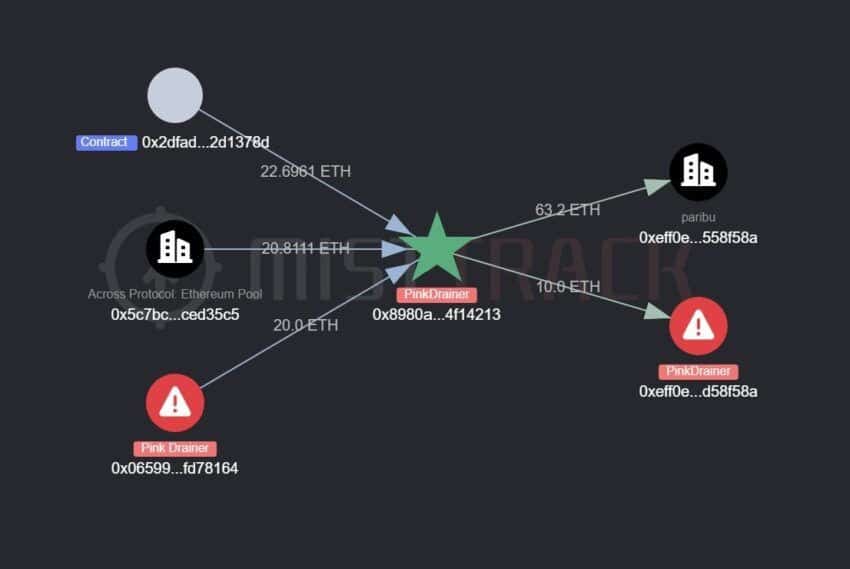The notorious phishing organisation Notorious Pink Drainers has been scammed, losing $30,000 worth of Ethereum. A recent report suggests that the infamous group, known for its sophisticated phishing schemes, fell victim to fraud itself, in an organised cybercrime.
Phishing Masters, the Notorious Pink Drainers Tricked by Fake Wallet Address
According to MistTrack, a prominent crypto-tracking tool, an address connected to the Pink Drainers was deceived by an address poisoning scam. In late June, the group lost 10 Ethereum (ETH) to a phoney wallet address. This incident underscores the growing risks and sophistication of cybercrime.
MistTrack detailed the incident in a post on X (formerly Twitter), displaying transaction histories that included transfers to both legitimate and fraudulent addresses. One image revealed transactions involving 20 ETH arriving and multiple transfers of 10 ETH, demonstrating the effectiveness of the scam. The fraudulent address closely mimicked a real one, effectively tricking the Pink Drainers.

Notorious Pink Drainers’ Transaction Routes and Scam
The transaction routes of the Pink Drainers, as analyzed by MistTrack, included transfers to a genuine address (0xEfF0ECD2eB275C3CEE4A17D9B8f10151) and a bogus one (0xEfF0eCD2eB275C3CEE4A17D9B8f101). The scam exploited the similarities between the addresses, deceiving the Notorious Pink Drainers to send funds to the wrong address.
According to Scam Sniffer’s Dune dashboard, Pink Drainers stole approximately $85.29 million from 21,131 victims between July 2023 and May 2024. This ironic twist saw the hunters become the hunted, demonstrating the unpredictable nature of cybercrime.
Growing Sophistication of Phishing Attacks
A recent report from CertiK highlighted that phishing remains the most costly attack vector in the second quarter of 2024, with $433.68 million lost across 67 incidents. These attacks accounted for the majority of financial losses in the cybersecurity sector. In the first half of 2024 alone, phishing attacks resulted in a staggering $497.73 million in losses across 150 incidents, underscoring their persistent threat.
The report noted that phishing attacks have been more frequent and financially damaging than private key compromises. One notable loss in Q2 involved a victim losing approximately $68.59 million in Wrapped Bitcoin (WBTC) due to an address poisoning attack. The victim had unknowingly set the stage for the theft by sending a small test transaction to a new wallet.
Significant Phishing Incidents
Another significant incident involved a victim losing about $7.09 million worth of EtherFi (LQIDETH) tokens through an address poisoning scam. Interestingly, the attacker returned some of the stolen tokens. Despite these rare instances of restitution, most phishing victims do not see their funds returned.
“You can’t rely on an attacker returning your funds, and an incident where this happens still deserves to be included in the overall figures pertaining to value lost. Others are not so lucky. These two incidents were the only two cases we identified of phishing victims seeing their lost funds returned,” the CertiK team noted in its report.
The Unpredictable Nature of Cybercrime
Past research by Scam Sniffer revealed that hostile groups like Pink Drainers operate with corporate-like efficiency. When one group disbands, another quickly takes its place. For instance, Angel Drainer emerged following Inferno Drainer’s departure, perpetuating the cybercrime cycle.
This recent incident involving the Notorious Pink Drainers scam highlights the ever-present and evolving threats within the cybercrime landscape. Even the most notorious and sophisticated cybercriminals are not immune to the tricks and scams they so often deploy against others. This twist serves as a stark reminder of the importance of vigilance and robust security measures in cryptocurrency.
Protecting Your Crypto
Given the rising sophistication of scams like the Notorious Pink Drainers scam, individuals must take proactive steps to secure their crypto assets. Here are some essential tips:
- Double-check Wallet Addresses: Always verify wallet addresses before transferring funds. Consider using a small test transaction to ensure accuracy.
- Use Secure Wallets: Opt for reputable, secure wallets with robust security features.
- Stay Informed: Keep up with the latest news and updates in the crypto world to stay aware of new threats and scams.
- Enable Two-Factor Authentication: Enhance your account security by enabling two-factor authentication (2FA) wherever possible.
- Beware of Phishing Attempts: Be cautious of unsolicited messages and emails requesting personal information or prompting you to click on suspicious links.
In conclusion, the Pink Drainers scam serves as a stark reminder of cybercrime’s ever-evolving nature. Even seasoned cybercriminals can fall victim to scams, emphasizing the need for constant vigilance and robust security measures. Individuals can better protect their crypto assets from falling into the wrong hands by staying informed and taking proactive steps, such as staying glued to The Bit Journal.




























